Think you’re settling in for the same dungeon-crawling adventure you’ve played before? Think again.
Developers Digital Sun give you something different from the traditional dungeon-crawling experience with Moonlighter. Not only must you explore the various dungeons in the small commercial village of Rynoka, but you must act as the town’s shopkeeper and sell the many treasures you find from the ruins you’ve explored.
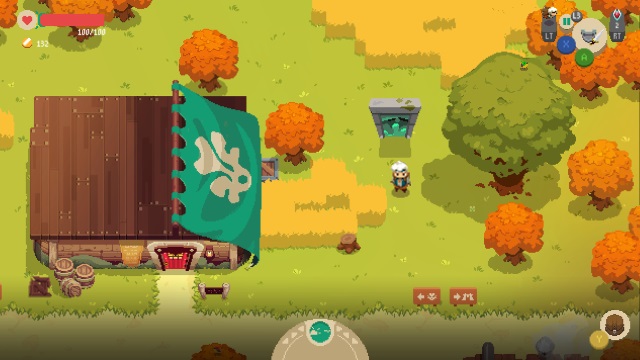
The game introduces wonderfully woven-together mechanics throughout your entire experience to give you a genuinely enjoyable adventure. These enjoyable mechanics will easily drive you to complete all four of the unique dungeons, and to at last open the final and mysterious fifth dungeon.
Will’s Adventure
You assume the role of Will, who dreams of becoming an adventurer, and the game begins when he makes his first attempt in the Golem dungeon. Things don’t exactly go to plan, and he gets spit right back out to the entrance.
These dungeons rest outside of Rynoka. Previously, they were brimming to the rim with treasure, but after 70 years, they’ve become far too dangerous for common adventurers to risk exploring. As a result, Rynoka suffers, and many of the occupants have little hope of a revival.
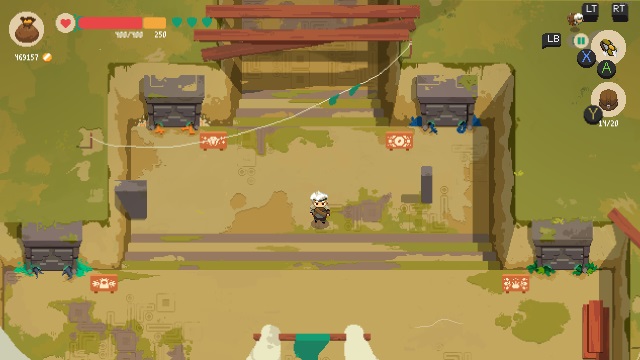
That is, until Will returns to claim his family’s shop, Moonlighter. The shop was once owned by Will’s father, who died attempting to open up the final gate.
You start the game with a sword and shield, as well as a broom. The only way to earn more stuff and get further in the game is to charge into a dungeon, loot the enemies, and make it out alive — this doesn’t always happen.
There are two main objectives in this game: run your shop effectively to fund your dungeon adventures, and complete the dungeons to find better loot. Along the way, you’re purchasing upgrades for the town and for your shop in order to return them to their former glory.
The two ideologies complement one another beautifully, and one side does not overshadow the other. The further you progress in the game, the harder the dungeons become. As the dungeons increase in difficulty, the more expensive items you can find as you continue to dive deeper into each one.
The Dungeons and Combat
All of the dungeons have three floors, with a final boss at the end. Each time you jump into a dungeon, all of the rooms get mixed around and the game’s procedural engine crafts a new layout. The map should feel different every time you enter.
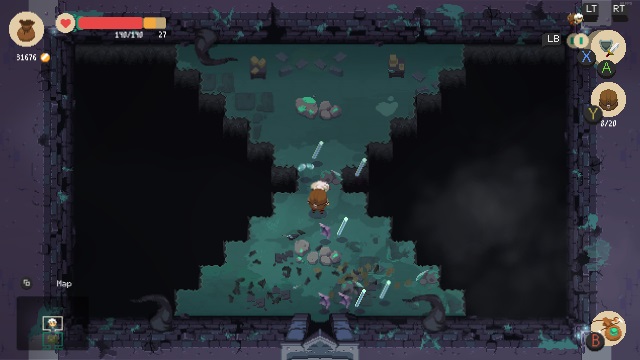
The developers, amusingly, worked this into the game’s lore. One of the old adventurers, Crazy Pete, left behind numerous notes about his experiences. He points out that no matter how many adventurers enter a dungeon at the same time, they will never run into each other and they will never play through a similar map. While this was not a necessary detail, it provides a sense of fun and gives you an idea of the playful world of Moonlighter.
Once inside the dungeon, you must hack, slash, and dodge enemies in order to survive. The combat is straightforward. Dodging provides you with a small amount of invincibility, and all of the enemies come with a distinct pattern.
You can wield two different weapon sets, and switching between them requires a simple button press. You have five different weapons at your disposal: sword and shield, bow, two-handed sword, spear, and a pair of fighting gloves.
None of the weapons stand out as the obvious choice to always take with you, as I only ever used the fighting gloves; I thought of Will as being the scrappy adventurer that he was, and he remained light on his feet.
Will must don armor, too. There are three different flavors: one with less armor but more speed, one with no speed but medium armor, and one with the most armor but less speed. Much like the weapons, these play with your chosen style, and there’s no correct answer to what you should wear. Will is not a mage, and there is no magic.
In order to prevent you from grinding and getting to the best gear, you must gather up ingredients only found in the latest dungeon to craft the weapons at the local blacksmith. If you want to proceed to the next gear level, you’ll have to advance to the next dungeon, which is only done by defeating the final boss.
This made advancement feel significant, and when I opened up a new dungeon, a new level of difficulty came with it. It was a good reminder of how far I had come and how delicate the gameplay was every time I opened up a new gate.
The enemies in each dungeon come with a theme. The first dungeon, the Golem Dungeon, features a number of ancient mechanical beings; they’re a blend of stone and unknown magic. Small ticks above your foe’s health indicate how difficult they are. The more ticks they have, the more health they have and the harder they hit.
Many may worry that these starting creatures become staples in the game and simply receive a color palette swap for every new dungeon you open up.
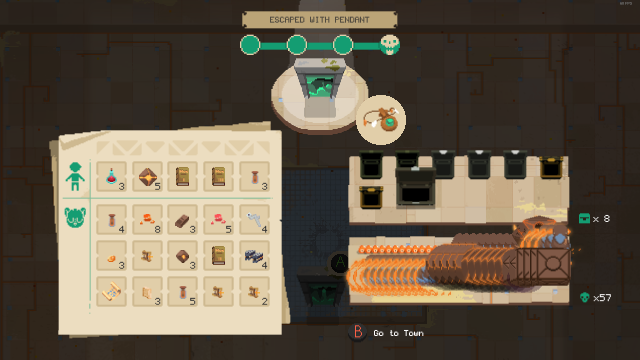
Subdue your fears. While a handful of enemies do exist in multiple dungeons, a majority of the foes you face remain exclusive to a specific area, and you’ll only ever find them there. This makes combat in every new dungeon you unlock feel fresh and forces you to learn all their new move sets. You must adapt to these new foes every time as you work towards cutting them down for their highly sought-after valuables.
The Shop Life
When Will returns from his night of adventuring, he has to assume the role of shopkeeper and sell the many items he found during his nightly escapades to an array of customers.
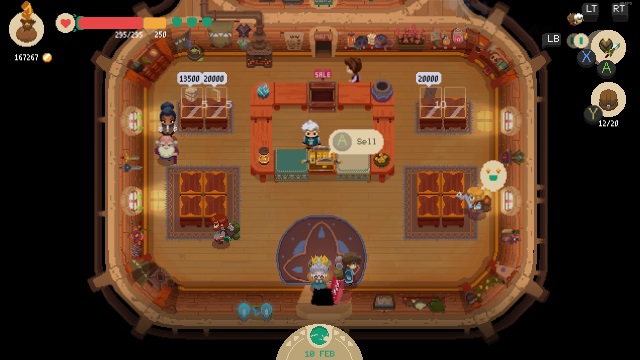
The items you find do not come with a price tag attached to them. Instead, you have to gauge your customer’s reactions to find the appropriate price for the item, and you change the price based on their reaction. Sometimes you’ll walk away with a great profit; at other times, a customer receives a steal for an item, and you’ll have to hastily adjust how much it’s worth to make sure you receive the right amount for it with the next customer.
If you’re willing to pay enough attention, you can see in your shopkeeper’s book when an item from your store becomes popular. When you see a popular item, you can raise its price in your shop and receive a higher profit.
An item’s popularity may influence how your next dungeon run goes, based on how much you’re hurting for money. The same goes for when you have too many of the same items in your shop — the more you have on display, the more likely customers will think the price needs to drop. Supply and demand remains a cruel mistress.
This mechanic wasn’t a critical one. You don’t receive negatives for not intently paying attention, but you are rewarded. You may find you can bump up several items in your shop for more, especially when you need the money for that next shop upgrade or to purchase another vendor for your town.
Every so often, a robber enters your shop in the hopes of snagging one of your items when you’re not paying attention. You’ll have to act fast as they race to the door with their prize. I’ve yet to find myself looted by one of these poachers, but I can imagine the heartbreak if they stole an item worth around 10,000 gold.
Other than the robberies, there’s a casual approach to gameplay in the shop. There’s no stress on your shoulders to consistently pay attention to every customer.
This makes running the shop a far more enjoyable occasion than it could have been and something I looked forward to every time I returned from the dungeon; not only was I excited to see how much I made, but I always wondered how much more I could charge for an item before my customers got angry.
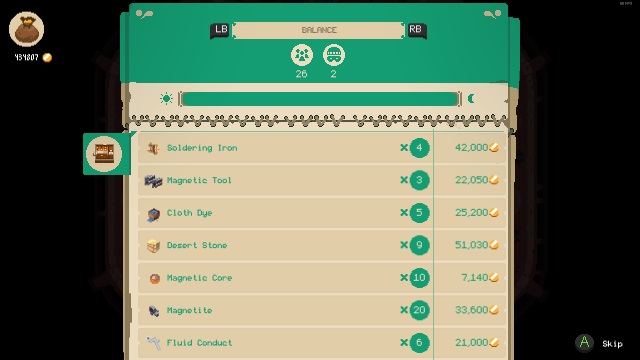
As you upgrade your shop, not only do you add more displays to show off more items, but you can also start taking specific orders for customers to locate certain items in a dungeon. Thankfully, this mechanic never forced me to have to return to previous areas and do any backtracking. Every customer wanted an item from the latest dungeon, and they paid a considerable amount more than the item was worth in the shop.
I took orders from every customer who walked up to my shop.
Inventory Management Is a Mechanic
When many hear “inventory management,” their spines may lock up, and they immediately wait to endure the inevitable fight they’re about to have with the backpack in their game as they mix and match their belongings.
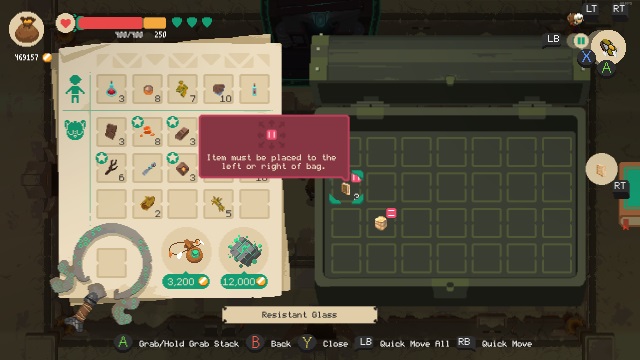
Digital Sun again blends this understanding and beautifully incorporates it into what things matter for an adventurer in Moonlighter.
You’re not only picking up items from the enemies you fight; you’re also looting chests found scattered throughout the dungeons. To shake up the mundane, many of the items in the chests come with a curse attached to them. This curse can potentially benefit you, or it can cause annoying problems when you return to town, such as destroying an adjacent item when you teleport back.
Will can only carry so much. You’re given a limited space of a 4×5 inventory to look over, and should you die during your adventure, you only get to keep the loot at the top of the inventory. This forces you to choose what you prioritize the most during a particular run. You might have found a bunch of crafting materials you were eagerly seeking, or you found a precious item you know sells for a bunch in your shop.
I found myself spending a good minute or two at every chest rearranging my backpack to optimize my payload. You can always refer to your shopkeeper’s book with the press of a button to reference the price of an item. This helped the decision-making process. Additionally, items I needed for crafting the next item were given a small star, which again made them far more alluring than some of the cheaper items I found during my adventures.
There’s a delicate balance found in Moonlighter‘s inventory management that other, bigger games have failed to discover. Sure, you die and lose almost everything you have, but you also keep a fair amount as well. If you paid attention to your inventory, you still make it back out of the dungeon with the precious items you wanted. I never walked away from a death feeling like I was robbed or cheated. It only meant I had to try again, and just like Will, I was eager to.
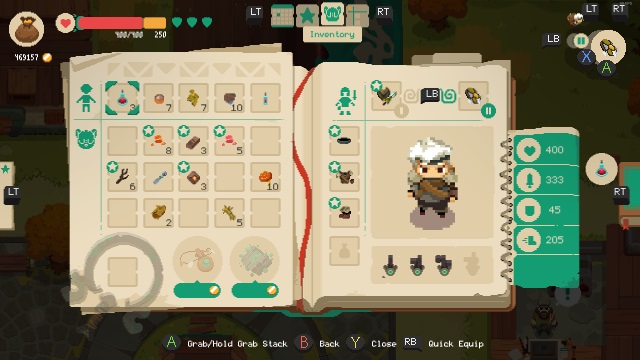
At the End of the Day
Every mechanic in Moonlighter feels like it was laced over the others with heavy consideration. Nothing felt tacked on or as if it had been included because it was something other games had already done. Running the shop becomes just as important as having a good dungeon adventure, and the game progresses in a healthy fashion to where I never felt things were getting easy.
Moonlighter wants players to have a good time while they tend their shop and fight endless dungeons of foes, and both make for a fantastic adventure.
Note: Review copy provided by the publisher.

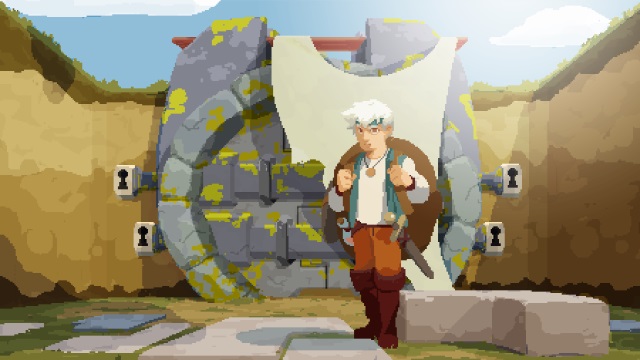





Published: Jun 4, 2018 5:11 PM UTC